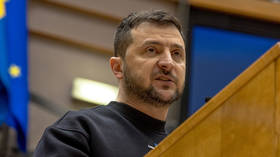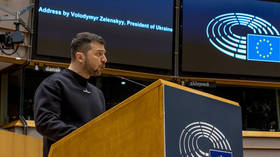Zelensky takes credit for derailing Minsk agreements

Ukrainian President Vladimir Zelensky personally refused to implement the Minsk agreements – a roadmap for peace in the east of the country, which was co-sponsored by Germany and France.
He made the admission during an interview with Der Spiegel published on Thursday as he continues his tour across Europe.
Zelensky said he viewed the agreements as a “concession” on Ukraine’s part, and never once actually sought to implement them. Instead, they were merely used to exchange prisoners with the two breakaway Donbass republics.
The president claimed he openly told that to then-German Chancellor Angela Merkel, French President Emmanuel Macron, and Russian President Vladimir Putin back in 2019, with all of them acting “surprised.”
“But as for Minsk as a whole, I told Emmanuel Macron and Angela Merkel: ‘We cannot implement it like this,’” Zelensky stated. “I told [Putin] the same as the other two. They were surprised and said: ‘If we had known beforehand that you would change the meaning of our meeting, then there would have been problems even before the summit.’”
The Minsk agreements, originally brokered in 2014 and further expanded in 2015, envisioned a roadmap for reconciliation between Ukraine and the Donbass republics of Donetsk and Lugansk. The two regions rebelled against the country’s new authorities in the aftermath of the 2014 Maidan coup in Kiev, which ousted democratically elected President Viktor Yanukovich.
Ukraine’s failure to implement the agreement, which would have seen the breakaway territories reintegrated with the country but retain a special status, ultimately led to the ongoing conflict.
Since the outbreak of hostilities in Ukraine, multiple politicians have taken credit for the failure of the Minsk agreements, admitting they were merely a ruse to give Ukraine time to build up its military. Former Ukrainian president Pyotr Poroshenko was the first to admit last year that Kiev never intended to abide by them and used the deal to “create powerful armed forces.”
Merkel and another original signatory of the Minsk agreements, former French president Francois Hollande, have also since confirmed that this was actually the true goal of the deal.
Moscow considers these admissions to be evidence that the negotiations were conducted in bad faith and that the Ukrainian government and its backers had always intended for the Minsk agreements to flop and for the Donbass crisis to be resolved by force. Russia claims that its military campaign in Ukraine, launched last February, preempted an offensive planned by Kiev with NATO’s help. Ukraine, Germany, and France “lied to the people of Donbass, as they had a terrible fate planned for them, which Russia prevented,” Kremlin spokesman Dmitry Peskov said back in January.
“Germany, France and Ukraine were playing a swindle game with the Minsk agreements. Now is payback time,” he stated at the time.













